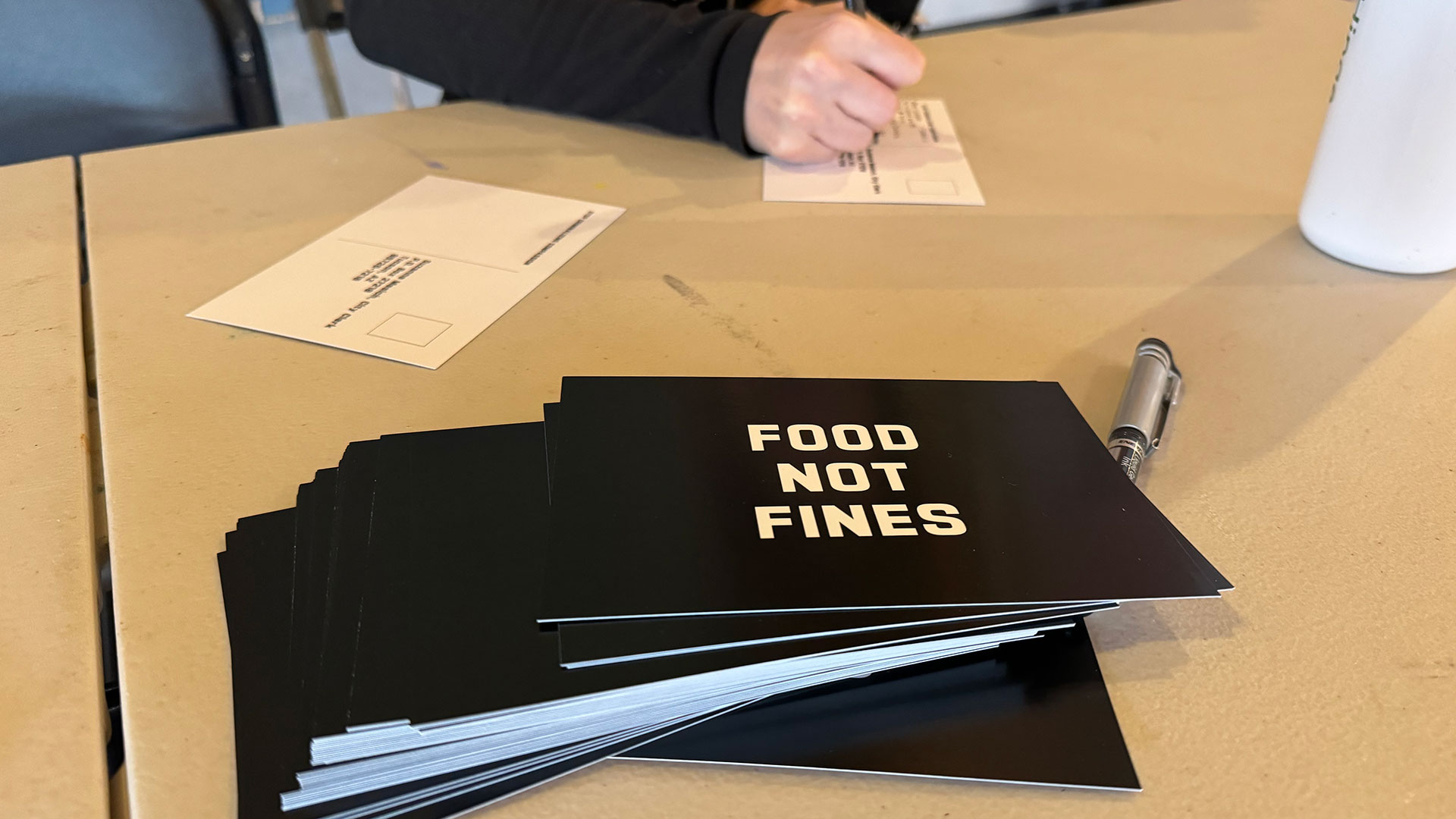 A woman writes a postcard to the Tucson Mayor and Council asking them to reconsider a city ordinance that requires a permit to distribute food to 10 or more people in city parks on Friday, March 15, 2024.
A woman writes a postcard to the Tucson Mayor and Council asking them to reconsider a city ordinance that requires a permit to distribute food to 10 or more people in city parks on Friday, March 15, 2024.
At least 1400 Tucsonans are currently homeless, according to last year’s annual unhoused survey, and the City of Tucson acknowledges that there are large gaps in services for them.
But volunteers who try to bridge those gaps say they feel unsupported, especially by one particular city ordinance.
According to housing expert Keith Bentele, a researcher for the Tucson Pima Collaboration to end Homelessness, only about one in eight individuals who try to get homeless assistance through city and county programs are actually helped.
“Often, they’re put into a kind of a back and forth for the caseworker or they’re put on a waitlist. But the seven out of eight essentially aren’t even contacted again, so there’s a huge gap,” he said.
Laura Ruiz is a member of Gator-Aid, a mutual aid group that passes out beverages in the summer months.
Ruiz says even though the city acknowledges that there is still much work to be done, the community members that try to make up for service gaps claim the city has a poor attitude towards their efforts.
“At best, it’s apathetic and kind of dismissive; at worst, it’s very hostile,” Ruiz said.
Amina Tollin is the founder of Unhoused Neighbors, a group providing food and hygiene supplies. She says this year the feelings of hostility have increased after a number of volunteer groups were asked to leave city parks.
“It feels like violence against the community and it feels like violence against survival, especially when the city misses the mark consistently,” she said.
In March, Ruiz and other aid providers gathered on Fourth Ave. to write postcards to the Tucson City Council asking them to repeal Ordinance 21-4B. It requires anyone distributing food and beverages to 10 or more people within city parks to obtain permits from both the City of Tucson and the Pima County Health Department.
The cards read “We Will Not Criminalize Care For Our Community,” and “Food Not Fines.”
There’s also some fine print in 21-4B that the aid groups say prevents them from serving food at unhoused “hotspots,” said Greg Jackson, Deputy Director of Tucson’s Parks and Recreation Department.
In 2022, the city amended its permit policy so that a park is deemed ineligible for permits if it’s within 1.5 miles of another place that provides meals, like a shelter or soup kitchen. Before that action, there were no location limits.
“We recognized close to those locations, there are already congregate meals being served,” Jackson said.
Jackson says the decision was made in conjunction with the Tucson Police Department. He says that most aid was happening in Santa Rita Park and Armory Park and the decision to limit community food service was an attempt to spread aid out.
“We were certainly getting complaints about trash being left around, food being left in the park,” he said. “If we want food to be going out to people who need it, why don't we look at areas where there are not congregate meals available and try to help those folks that don't really have easy access to meals.”
After multiple members were asked to leave city parks this year, mutual aid members began expressing concerns that Ordinance 21-4B is unequally enforced, since they had never had a problem before. City officials said the permit policy has always been in place.
Mutual aid members like Ruiz push back on the city’s claim that it’s necessary to spread aid out. Ruiz says an important distinction of mutual aid is going directly to individuals that either can’t access or don’t qualify for city-sponsored services, instead of putting the responsibility on the unhoused.
“First of all, with shelters and things like that, there are very high barriers. You cannot be using substances, a lot of times they don't have co-ed shelters. So, if you have a partner, or you have a child that's old enough, you cannot stay with them. Or if you have pets, you cannot bring your pet with you. Sometimes they're not accessible to people with disabilities,” Ruiz said.
Jackson said he disagrees that there’s a conflict and that he supports the groups’ efforts.
“It’s a permitting process just like we’ve always done, that’s no different … We as a city don't have all the resources to do this work. So we've got to work on third parties that can help us,” he said.
The City of Tucson has not revisited Ordinance 21-4 so far.

By submitting your comments, you hereby give AZPM the right to post your comments and potentially use them in any other form of media operated by this institution.